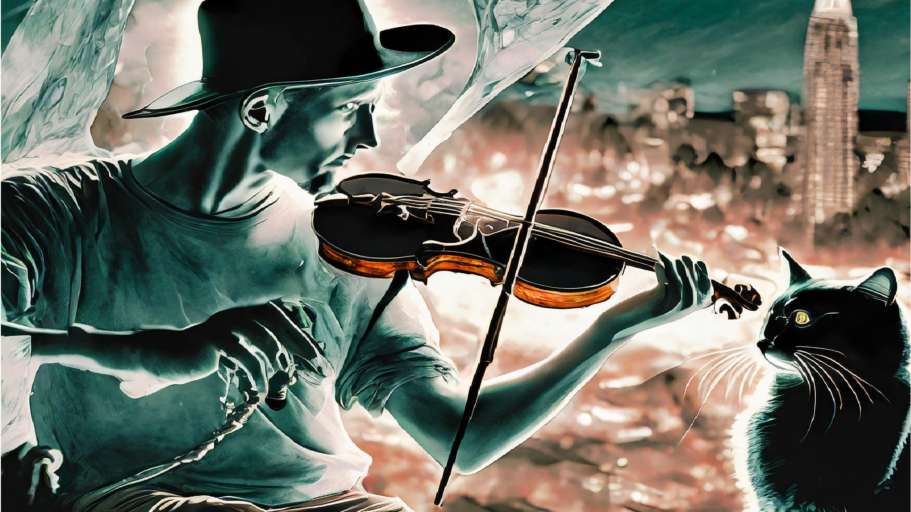LAST WEEK: Jasmine turned Jeremy into a vampire, and he turned Beethovan into a vampire cat. Bee ran away and began eating cats, dogs, and children. Jasmine abandoned Jeremy.
Read last week’s installment here. See all installments here.

Chapter 133
Jeremy
San Francisco — 1910
Metamorphosis
One night, Jeremy sees a woman, pirouetting along the cobbles, light as a whisper. Her dance calls to Jeremy, a breeze across the sea of loneliness.
He bites without thinking, scooping her drained body into his arms, and spiriting her into the cellar of an abandoned house. He watches as she twists and writhes, her mouth opening and closing in a quest for air. Puncturing his wrist, he forces it against her mouth. Feeling his blood, his being, flow into her is like a homecoming.
As she lies, pale and not yet conscious on the floor, he leaves. It’s almost dawn. Outside, a heap of old newspapers gently rises and falls inside the doorway of a shop. Jeremy looks at the paper. The gray edges curl upward with the heat of his desire. Smoke rises in the air, mingling with the fog. Under the blanket of ash, curled into a ball against the cold, lies an old woman.
She doesn’t even have time to scream. Jeremy’s teeth sink into her withered neck as easily as hope. He cradles her in his arms like a lost child. She smiles sadly up into his eyes.
Carrying her down to where the Pamela lies beneath the earth, he presses the old women’s shriveled wrist against Pamela’s open mouth. She sucks hungrily.
Unlike Jeremy, Pam doesn’t gag even once.
Chapter 134
Pamela
San Francisco — 1910
Transformations
Pamela is flying along cold brick lanes. An owl calls wistfully in the night. Low clouds hang like promises above the bay. She barely feels the bite. Just two tiny pricks in the back of her neck.
When she awakens, she is underground. It’s dark, very dark, but she can see. Her pupils are expanding, her insides whirling. She feels herself dissolving, twisting, churning. She tries to breathe but finds no air. She opens her mouth to scream but has no sound. She struggles, arms flailing, trying to rise from uncharted depths. And then a new pain grips her. It is an emptiness, a hunger deep and painful.
Something is held to her gasping mouth. It’s warm, and rich. It fills the desolation of her soul with comfort. She laps greedily, solace for mind and body. It isn’t until later, after she sees the waxen husk of an old woman, drained and still, that she understands.
Pamela never returns to the small apartment on Mission Street. She never sees Sarah again. She knows what will happen. Pamela is twenty-four.
She takes what solace she can with the one who has given her immortality. Jeremy, her vampire lover.
***
“I hate rough edges,” Nona says. “Half-finished garments that unravel. A cloth begins well, cut from the current style. The threads appropriate to time, place, and person, and then this, a change, but not an ending. The cloth cannot continue to be woven, nor can it be cut. There’s no conclusion. Enough patterns like this and there will be no need of us.”
“Don’t worry, Sister,” Morta smiles. “There will always be need of us. There are always endings.”
Chapter 135
San Francisco, 1911 – 1961
Loneliness
Vampires are solitary by nature. They may fall in love, but it never works out. The relationship of two large predators, lacking offspring to protect, is doomed. Inevitably prey gets scarce. Hunger trumps love. Need precludes desire.
Still, Pamela and Jeremy stay together from 1911 to 1961, an interminable time for two such creatures. Perhaps it is because neither has ever had the love of a family. Without each other, they are lost, doomed to eternal solitude.
They sleep in basements in the Tenderloin. They do not need coffins. It’s enough that it’s dark and cool. Like most vampires, they prey on the homeless and the lost, not because of conscience, but because of ease, convenience, and fear of discovery.
Vampires are not cuddly creatures. Despite their need, Pamela and Jeremy are no different. Although they make love, and lie in each other’s cool arms, they sleep apart.
The time when they lie, at twilight and just before dawn, cradled in each other’s arms is the sweetest either have ever known.
“Before you, there was no one. Bee, my cat, was the only one I had to love, the only one who loved me… or so I thought,” Jeremy sighs, caressing Pam’s auburn hair. “I changed him, I wanted to keep him with me forever, and instead I turned him into a monster. Life does that, at least it has for me. Turns love and hope and music into something terrible and deadly.”
Pam kisses his lips into silence. “I once had someone tell me ‘a ship in the harbor is safe, but ships are not built for harbors, nor life for safety.’ What we think is true turns out to be illusion time and again. But I know I love you, Jeremy. I love you now and for forever.”
Jeremy smiles. “Forever is a long time, even for us, my darling. The only time we are not totally alone, not locked inside this shell of a body, is when we are joined together, lips fused to lips, breathing as one, blood pulsing in unity, in harmony, but it’s so brief, that time of joining. We lie in each other’s arms as if parting were not so near, so inevitable, but at any moment, even that one, the earth could split, and we’d be torn asunder.
“Instead, we part each night as if it were normal. As if we’re certain to see each other in a few hours. I guess it’s the only way to make the great loneliness of existence possible.
“From the first instant I saw you, dancing like light down dark streets, singing a song that only you could hear, a melody that radiated between the alley walls making cobble stones carol, I wanted you. I had to bite. I had to taste your sweetness, hoping some glorious piece of that inner harmony would flow into my veins and make me whole.
“And yet, we are all alone in ourselves, always and forever, especially us, who have no end in sight. It is the loneliest way to be. I think, somehow, I must have always known that, deep inside and couldn’t bear it. I hoped love alone was enough for redemption. But my love for Bee turned him into a monster. And my love for you has made you a…”
Pamela puts one cold finger softly to his lips. “Shhh,” she says. She kisses him, tasting blood. It makes her hungry.
Chapter 136
River
San Francisco — 1987
The Crystal Necklace
Daylight. River roams the city, Huck on his shoulder. He aches with the memory of Pamela. He wants her. He fears her. A wind blows up from the bay, carrying on it salt and sorrow. He sees Pam’s lovely white body, overlaid with a wash of crimson.
In the window of a small boutique, something glistens. An odd, jeweled chain, hung with a crystal pendant radiating with iridescent color. It’s pricey, beyond his means really, but somehow it feels important. He cannot help but buy it. He leaves the shop, cradling it in his hands like a broken promise. He imagines it glistening on Pamela’s fragile neck, a miniature aurora borealis.
River wants to forget her, yet he knows that if he does, a part of him will die. His heart, closed for so long to all but the creatures of field, wood, and air, has opened itself to her and though he feels betrayed, he cannot keep away.
He hangs the chain around his neck. He will go to Bert’s and fasten it about hers. Then he will leave, never to return, the prism remaining, a crystal kiss, a tangible memory, a concrete regret.
Chapter 137
Pamela
San Francisco — 1961
Death and Memory
In 1961, workers building a subway in the Tenderloin knock through the basement of an old building. For an instant, they could have sworn they saw a young man of unearthly beauty, white and brilliant as a star, but at that moment, a board drops into the cellar and the vision dissolves. The basement floor is empty, containing only dirt and ash.
Out of the vanished night, from inside the deep recesses of the mind where nightmares dwell, leaps a creature, all fur and fang. Even as it springs through the air, the sun catches it, turning it to dust. Its ashes fall into the basement, sparkling like a million tiny, white moth wings burnt into nothingness by flame.
The men blink. Everything is normal. Eyes deny the sensation of what had been. They shiver, trying to contain their fear. Wordlessly, they move to the next building, never stopping to discover four pointed crystals and a silver bullet hidden in the dust.
In the night, Pamela returns to Jeremy. When she discovers the cellar, roof gone, exposed to the sky, she throws back her head and howls. Those who heard could never forget that sound. It invaded their thoughts and infected their slumber.
Energy, sound, light, and, very very occasionally, love, do not die. They are immortal, continuous, timeless. They linger, echoing music from the past, showing visions of the future, and times that might have been.
That is why, on certain moonless nights, under the dark sky, a boy with seal-black hair and emerald eyes can be seen in the Tenderloin, playing a fiddle to a midnight cat. The cat weaves around his legs as he plays, forming the sideways ∞ of infinity, as if binding him with the mysteries of the universe.
Passersby often pause, straining to hear the music, thinking to drop a few coins. But the boy has no hat to put money into, and his fiddle makes no sound.
Confronted by the light of car headlight or cellphone camera, the boy and cat vanish, leaving only the fragrance of loss and violets in the air. The bystanders wander off, shaking their heads, forgetting the vision but remembering the scent. That night they will be especially tender to their loved ones. Arguments will dissolve like sugar in water. Disagreements will be seen for the silly waste of time they are. Their sleep will be filled with dreams of starlight, seagulls, and the sweetest music they have ever heard. And on the next new moon, without even knowing why, they will stroll out to the Tenderloin searching for a silent symphony.
Pamela, however, is alone again alone, and lonelier than she has ever been.
Watch the author read this week’s installment in the video below:

NEXT WEEK: Pamela roams the city, spending each night in a different place. If instinct had not pushed her underground, she would have stayed outside to greet the dawn. She would have welcomed it, a brief burning and then nothing, a fleeting agony in exchange for oblivion, a small price to pay for cessation of sorrow.
Edited by Mitchelle Lumumba and Sophie Gorjance.
E.E. King is cohost of the MetaStellar YouTube channel's Long Lost Friends segment. She is also a painter, performer, writer, and naturalist. She’ll do anything that won’t pay the bills, especially if it involves animals. Ray Bradbury called her stories “marvelously inventive, wildly funny and deeply thought-provoking. I cannot recommend them highly enough.” She’s been published widely, including Clarkesworld and Flametree. She also co-hosts The Long Lost Friends Show on MetaStellar's YouTube channel. Check out paintings, writing, musings, and books at ElizabethEveKing.com and visit her author page on Amazon.

